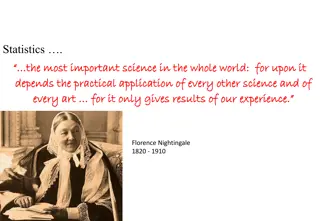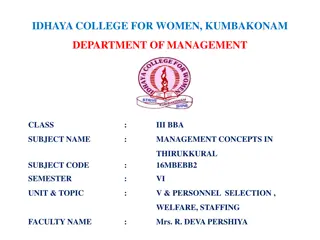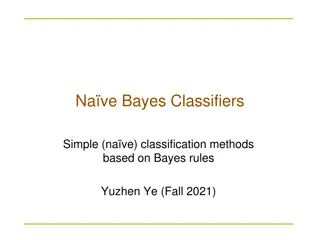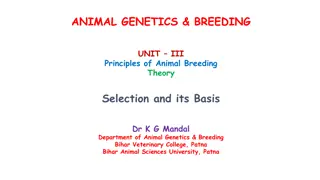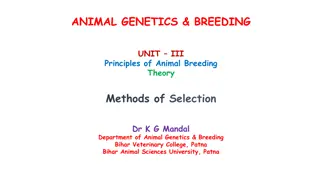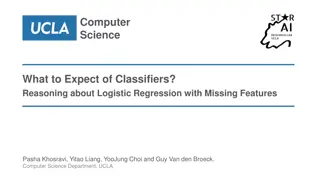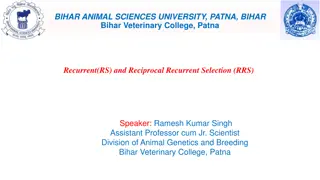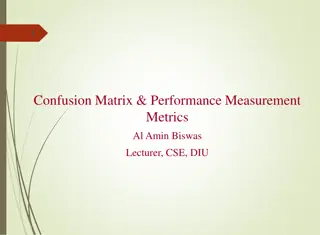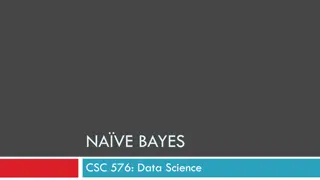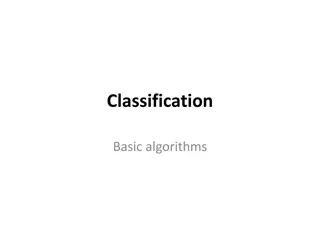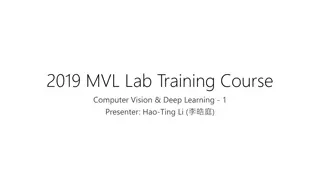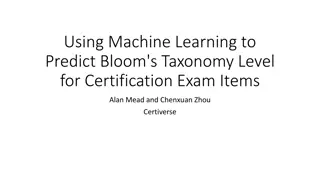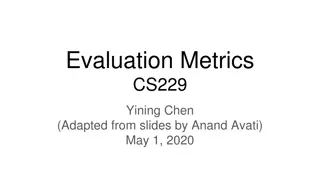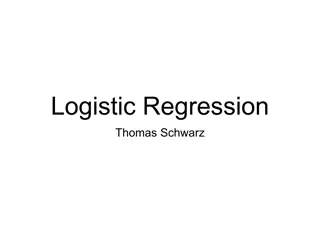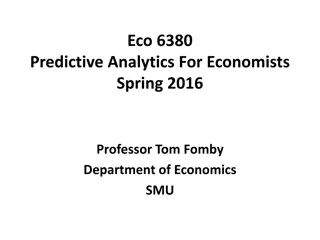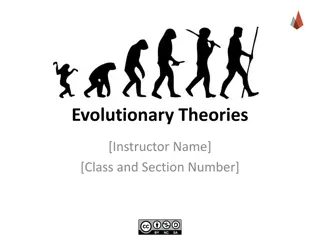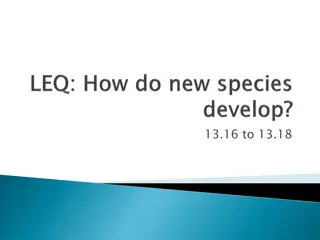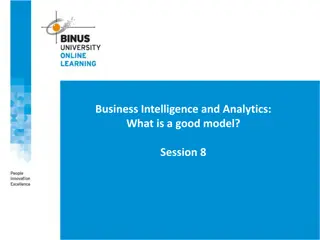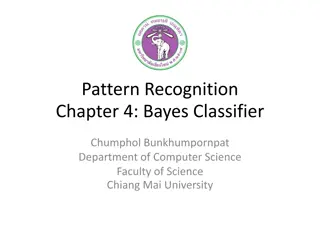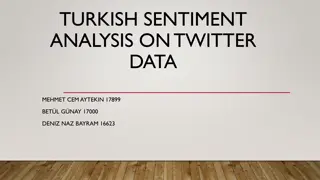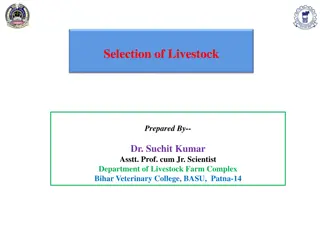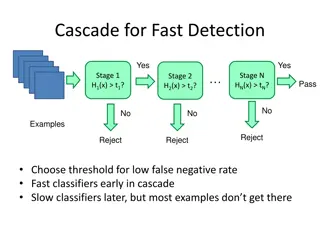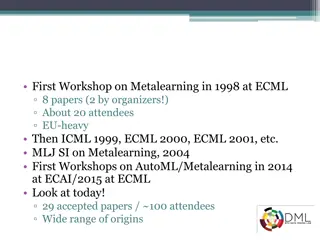INDIAN ARMY AGNIVEER SELECTION PROCESS 2024
https:\/\/youtube.com\/shorts\/3Errhs-10LM?si=gWwlhucXivM1v02s\n\n\n\nIndian Army Agniveer Selection Process 2024\nManasa Defence Academy is proud to offer the best Army training programs, including the NDA Crash Course (6 Months) and NDA Advance Course (1 Year). In this blog post, we will explore t
3 views • 1 slides
Understanding Logistic Regression Model Selection in Statistics
Statistics, as Florence Nightingale famously said, is the most important science in the world. In this chapter on logistic regression, we delve into model selection, interpretation of parameters, and methods such as forward selection, backward elimination, and stepwise selection. Guidelines for sele
4 views • 33 slides
Screw classifier
CraftsmenCrusher's screw classifier is an innovative solution designed to efficiently separate and dewater solids from liquids.
1 views • 1 slides
Counterfeit Detection Techniques in Currency to Combat Financial Fraud
Currency counterfeiting poses a significant challenge to the financial systems of countries worldwide, impacting economic growth. This study explores various counterfeit detection techniques, emphasizing machine learning and image processing, to enhance accuracy rates in identifying counterfeit curr
0 views • 15 slides
Management Concepts in Personnel Selection and Welfare at Idhaya College for Women, Kumbakonam
The Department of Management at Idhaya College for Women in Kumbakonam offers insights into the importance of personnel selection in organizations. The process of personnel selection involves hiring individuals with the required qualifications to fill vacant positions. Proper selection and placement
0 views • 20 slides
Understanding Evaluation and Validation Methods in Machine Learning
Classification algorithms in machine learning require evaluation to assess their performance. Techniques such as cross-validation and re-sampling help measure classifier accuracy. Multiple validation sets are essential for comparing algorithms effectively. Statistical distribution of errors aids in
0 views • 95 slides
Understanding Naive Bayes Classifiers and Bayes Theorem
Naive Bayes classifiers, based on Bayes' rules, are simple classification methods that make the naive assumption of attribute independence. Despite this assumption, Bayesian methods can still be effective. Bayes theorem is utilized for classification by combining prior knowledge with observed data,
0 views • 16 slides
Principles of Animal Breeding: Selection and its Basis
Selection in animal breeding involves choosing the best individuals to improve specific traits. Criteria for selection include individual merit, competitive exams, and interviews. Selection of farm animals focuses on non-random reproduction of genotypes. Types of selection include natural and artifi
1 views • 40 slides
Principles of Animal Breeding Theory and Methods of Selection
Animal breeding involves selecting for desirable traits to improve the overall merit of animals. Methods such as tandem selection and multi-trait selection are used to enhance genetic progress. Economic value, genetic significance, and selection criteria play important roles in the breeding process.
1 views • 16 slides
Building Sentiment Classifier Using Active Learning
Learn how to build a sentiment classifier for movie reviews and identify climate change-related sentences by leveraging active learning. The process involves downloading data, crowdsourcing labeling, and training classifiers to improve accuracy efficiently.
0 views • 47 slides
What to Expect of Classifiers: Reasoning about Logistic Regression with Missing Features
This research discusses common approaches in dealing with missing features in classifiers like logistic regression. It compares generative and discriminative models, exploring the idea of training separate models for feature distribution and classification. Expected Prediction is proposed as a princ
1 views • 19 slides
Recruitment and Selection Process in Human Resource Management
Recruitment and selection are vital processes in human resource management. Recruitment involves attracting candidates for job positions within an organization through various sources, both internal and external. The steps in recruitment include planning, strategy development, searching, screening,
0 views • 6 slides
Understanding Selection Strategies in Animal Genetics and Breeding
Genes influence traits through Additive Gene Action (AGA) and Non-Additive Gene Action (NAGA) in animal breeding. Recurrent Selection (RS) and Reciprocal Recurrent Selection (RRS) play crucial roles in improving animals. Selection for General Combining Ability (GCA) and Specific Combining Ability (S
0 views • 16 slides
Understanding Confusion Matrix and Performance Measurement Metrics
Explore the concept of confusion matrix, a crucial tool in evaluating the performance of classifiers. Learn about True Positive, False Negative, False Positive, and True Negative classifications. Dive into performance evaluation metrics like Accuracy, True Positive Rate, False Positive Rate, False N
3 views • 13 slides
Understanding Naive Bayes Classifier in Data Science
Naive Bayes classifier is a probabilistic framework used in data science for classification problems. It leverages Bayes' Theorem to model probabilistic relationships between attributes and class variables. The classifier is particularly useful in scenarios where the relationship between attributes
1 views • 28 slides
Evaluating Website Fingerprinting Attacks on Tor
This research evaluates website fingerprinting attacks on the Tor network in the real world. It discusses the methodology of deanonymizing Tor users through predicting visited websites, emphasizing the need for labels to train machine learning classifiers. The study presents a threat model involving
0 views • 26 slides
Understanding Basic Classification Algorithms in Machine Learning
Learn about basic classification algorithms in machine learning and how they are used to build models for predicting new data. Explore classifiers like ZeroR, OneR, and Naive Bayes, along with practical examples and applications of the ZeroR algorithm. Understand the concepts of supervised learning
0 views • 38 slides
Selection Board Training and Human Resources Responsibilities in Hawaii National Guard
This document outlines the agenda for the Selection Board Training conducted by the Hawaii National Guard Human Resources Office. It covers recruitment, selection processes, decision-making, and job offer responsibilities. References to relevant U.S. Codes and Acts are provided. The structure of the
0 views • 48 slides
HelmholtzCloud Service Selection Process Overview
The Helmholtz Cloud Service Selection Process is detailed through service surveys, iterations, criteria types, and exclusion processes. Service providers deliver data, weighting and selection criteria are applied, and candidate services are listed based on surveys and integrations. Criteria categori
0 views • 41 slides
Enhancing Internet Telephony Quality Through Predictive Relay Selection
Examining the quality of Internet telephony in relation to network performance, this research explores the use of Managed Overlay to improve call quality for services like Skype. Analysis of 430 million Skype calls reveals that a significant portion experience poor network performance, emphasizing t
1 views • 26 slides
Understanding Image Classification in Computer Vision
Image Classification is a crucial task in Computer Vision where images are assigned single or multiple labels based on their content. The process involves training a classifier on a labeled dataset, evaluating its predictions, and using algorithms like Nearest Neighbor Classifier. Challenges and the
0 views • 16 slides
Enhancing Certification Exam Item Prediction with Machine Learning
Utilizing machine learning to predict Bloom's Taxonomy levels for certification exam items is explored in this study by Alan Mead and Chenxuan Zhou. The research investigates the effectiveness of a Naïve Bayesian classifier in predicting and distinguishing cognitive complexity levels. Through resea
0 views • 19 slides
Understanding Evaluation Metrics in Machine Learning
Explanation of the importance of metrics in machine learning, focusing on binary classifiers, thresholding, point metrics like accuracy and precision, summary metrics such as AU-ROC and AU-PRC, and the role of metrics in addressing class imbalance and failure scenarios. The content covers training o
0 views • 31 slides
Understanding Binary Outcome Prediction Models in Data Science
Categorical data outcomes often involve binary decisions, such as re-election of a president or customer satisfaction. Prediction models like logistic regression and Bayes classifier are used to make accurate predictions based on categorical and numerical features. Regression models, both discrimina
0 views • 67 slides
Effective Data Augmentation with Projection for Distillation
Data augmentation plays a crucial role in knowledge distillation processes, enhancing model performance by generating diverse training data. Techniques such as token replacement, representation interpolation, and rich semantics are explored in the context of improving image classifier performance. T
0 views • 13 slides
Understanding Classifier Performance in Target Marketing
Explore the importance of classifier performance in target marketing scenarios such as direct marketing, consumer retention, credit scoring, and bond ratings. Learn how to efficiently allocate resources, identify high-value prospects, and evaluate classifiers to maximize profit in marketing campaign
0 views • 23 slides
Evolutionary Computation and Genetic Algorithms Overview
Explore the world of evolutionary computation and genetic algorithms through a presentation outlining the concepts of genetic algorithms, parallel genetic algorithms, genetic programming, evolution strategies, classifier systems, and evolution programming. Delve into scenarios in the forest where gi
0 views • 51 slides
Understanding Evolutionary Theories and Strategies
Exploring evolutionary theories such as Sexual Selection Theory and Gene Selection Theory sheds light on how characteristics evolve for mating advantage. Insights into intersexual and intrasexual competition offer a deeper understanding of mate selection preferences. Gene selection mechanisms influe
0 views • 20 slides
Understanding Natural Selection and Its Mechanisms
Explore the concepts of natural selection, survival of the fittest, and various types of selection processes in evolutionary biology. From the struggle for existence to sexual selection, learn how organisms adapt to their environment through genetic contributions and mating strategies. Discover exam
0 views • 8 slides
Understanding Model Evaluation in Business Intelligence and Analytics
Explore the importance of measuring model performance, distinguishing between good and bad outcomes, evaluating accuracy using confusion matrices, and the significance of the confusion matrix in analyzing classifier decisions.
0 views • 31 slides
Student of the Year Guidelines and Selection Process Overview
Explore the revised 2020 Student of the Year guidelines, understand the selection process for Grades 5, 8, and 12, learn about scoring form revisions, LEA roles, components, paperwork submission, and more. Get insights on starting the selection process and completing necessary forms. Discover how in
0 views • 23 slides
Understanding Bayes Classifier in Pattern Recognition
Bayes Classifier is a simple probabilistic classifier that minimizes error probability by utilizing prior and posterior probabilities. It assigns class labels based on maximum posterior probability, making it an optimal tool for classification tasks. This chapter covers the Bayes Theorem, classifica
0 views • 24 slides
Implementing Turkish Sentiment Analysis on Twitter Data Using Semi-Supervised Learning
This project involved gathering a substantial amount of Twitter data for sentiment analysis, including 1717 negative and 687 positive tweets. The data labeling process was initially manual but later automated using a semi-supervised learning technique. A Naive Bayes Classifier was trained using a Ba
0 views • 17 slides
NSH_SFC 17.01 Performance Report Summary
The NSH_SFC 17.01 Performance Report focuses on measuring and analyzing the performance of various elements such as Service Function Forwarder, NSH Proxy, NSH Classifier, and more in the context of VPP 17.01 for different SFC ingredients. Baseline performance is established using IXIA-based PacketGe
0 views • 7 slides
Brigade Commander and Staff Selection Process Decision Briefing
In the decision briefing for the selection process of APS JROTC Brigade Commander and Staff, the purpose is to determine the best process that meets the needs, constraints, and preferences. The plan is to implement a standardized nomination and evaluation process in the selection of Brigade Commande
0 views • 18 slides
Understanding Selection Methods in Livestock Breeding
Livestock breeding involves various methods of selection such as individual selection, pedigree selection, progeny selection, and more. These methods aim to improve desirable traits in animals through controlled breeding programs. Selection criteria include performance, genetic lineage, and specific
0 views • 27 slides
Object Detection Techniques Overview
Object detection techniques employ cascades, Haar-like features, integral images, feature selection with Adaboost, and statistical modeling for efficient and accurate detection. The Viola-Jones algorithm, Dalal-Triggs method, deformable models, and deep learning approaches are prominent in this fiel
0 views • 21 slides
Exploring Metalearning and Hyper-Parameter Optimization in Machine Learning Research
The evolution of metalearning in the machine learning community is traced from the initial workshop in 1998 to recent developments in hyper-parameter optimization. Challenges in classifier selection and the validity of hyper-parameter optimization claims are discussed, urging the exploration of spec
1 views • 32 slides
Vigil Nomination and Selection Process Overview
The Vigil Nomination and Selection Process involves processes at both the chapter and lodge levels, including the appointment of chairman and adviser, duties of the nominating committee, eligibility criteria, survey letters, nominee selection, completing nomination forms, and deadlines for submissio
0 views • 30 slides
Challenges in Staff Selection for Equality and Diversity in Academic Institutions
Despite some progress, challenges persist in the selection of staff in academic institutions, particularly concerning under-selection of minority ethnic staff and those with disabilities. The report highlights disparities in selection rates based on gender, age, nationality, and ethnicity. Addressin
0 views • 27 slides

